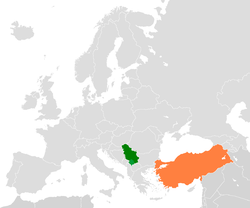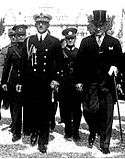Serbia–Turkey relations
 |
|
Serbia |
Turkey |
|---|---|
Serbian–Turkish relations are foreign relations between Serbia and Turkey. Serbia has an embassy in Ankara and a consulate-general in Istanbul. Turkey has an embassy in Belgrade. Both countries are full members of the Council of Europe, the Organization for Security and Co-operation in Europe (OSCE), the Central European Free Trade Agreement (CEFTA) and the Organization of the Black Sea Economic Cooperation (BSEC).
Agreements
In June 2009, the two countries signed a free trade agreement.[1]
Modern relations
Turkish Defense Minister Vecdi Gönül and Serbian Defense Minister Dragan Šutanovac met in Ankara on 12 May 2009 to sign a defence cooperation agreement. Gönül stated that, “Although we do not have a common border, we see Serbia as a neighbour,” and, “Turkey desires to maintain and improve its relations with Serbia the most, among all the other Balkan states.” Šutanovac confirmed that, “There are a lot of things to do in this field,”[2] and, “We are thinking of taking some initiatives in the defense industry together, like co-production in Turkey or Serbia.”[3]
Turkish President Abdullah Gül paid a visit to Serbia on 26 October 2009, and became the first Turkish President to visit Serbia since 1986.[4]
Erdoğan's Kosovo speech
In October 2013, Serbia's foreign ministry condemned a statement by Turkish Prime Minister Recep Tayyip Erdoğan that he made during a visit to Kosovo. Erdoğan said in his speech: "Do not forget that Kosovo is Turkey and Turkey is Kosovo". He also added that he "feels at home" whenever he visits Kosovo. The Serbian foreign ministry responded by saying that Erdoğan's remarks "cannot be received as friendly," and that the town of Prizren, where the speech was made, "is probably the least appropriate place for such statements" due to it being the initial burial place of Serbia's medieval emperor Dušan the Mighty.[5]
Various Serbian politicians, including Prime Minister Ivica Dačić[6] and parliament speaker Nebojsa Stefanovic,[5] rejected the Turkish PM's speech. Furthermore, the Turkish ambassador in Belgrade was summoned by the Serbian foreign ministry to demand explanations on October 26, and President Tomislav Nikolic announced Serbia's withdrawal from trilateral talks which included Turkey and Bosnia that same day,[7] demanding Turkey's apology for the "scandal".[8] The statements were also condemned by Heinz-Christian Strache, leader of the Freedom Party of Austria, who believed that Europe should rise against the Turkish PM. "His territorial pretensions in Europe are a step away from the restoration of the Ottoman Empire that Erdoğan wants," Strache said in his statement.[9]
However, Turkish Foreign Minister Ahmet Davutoğlu said during an interview on the TRT channel that Erdoğan's words have been misunderstood. "Remarks which have been cut out from the whole speech were taken to grounds we don’t want. We also aim to have good relations with Serbia. Turkey maintains an equal distance to all Balkan countries," Davutoğlu stressed.[8]
History

See also
- Foreign relations of Turkey
- Foreign relations of Serbia
- Turkish Serbs
- Turks in Serbia
- Islam in Serbia
References
- ↑ Turkey, Serbia Sign Free Trade Agreement
- ↑ "Turkey, Serbia sign deal on defense industry ties". Today’s Zaman. 2009-05-13.
- ↑ "Serbian defense minister: War with Kosovo not possible". Today’s Zaman. 2009-05-14.
- ↑ "Gül Becomes The First Turkish President to Visit Serbia in 23 Years". TurkishNY. 2009-10-26. Retrieved 2009-10-26.
- 1 2 "Serbia condemns Erdoğan's Kosovo remarks". Today's Zaman. 25 October 2013. Retrieved 18 December 2014.
- ↑ "Turkish PM's statement "crude violation of intl. law"". B92. 25 October 2013. Retrieved 18 December 2014.
- ↑ Baydar, Yavuz (28 October 2013). "Erdogan: 'Kosovo is Turkey'". Al-Monitor. Retrieved 18 December 2014.
- 1 2 "PM Erdoğan's words on Kosovo misunderstood by Serbia, says Turkish FM". Hürriyet Daily News. 27 October 2013. Retrieved 18 December 2014.
- ↑ "Kosovo is not Turkey, Erdogan will fail with new Ottoman Empire – Heinz-Christian Strache". InSerbia. 25 October 2013. Retrieved 18 December 2014.

